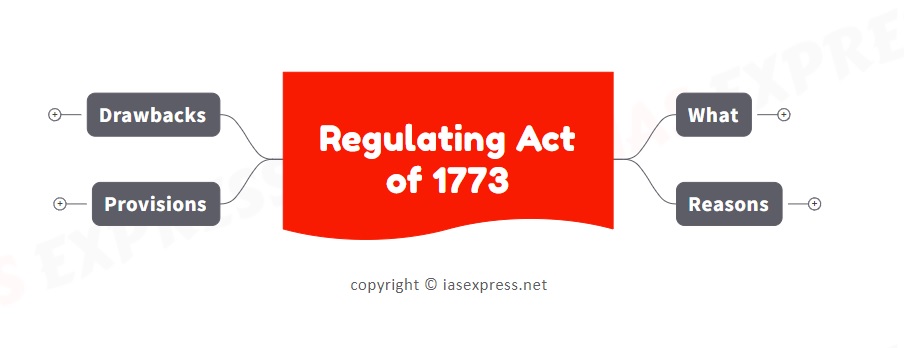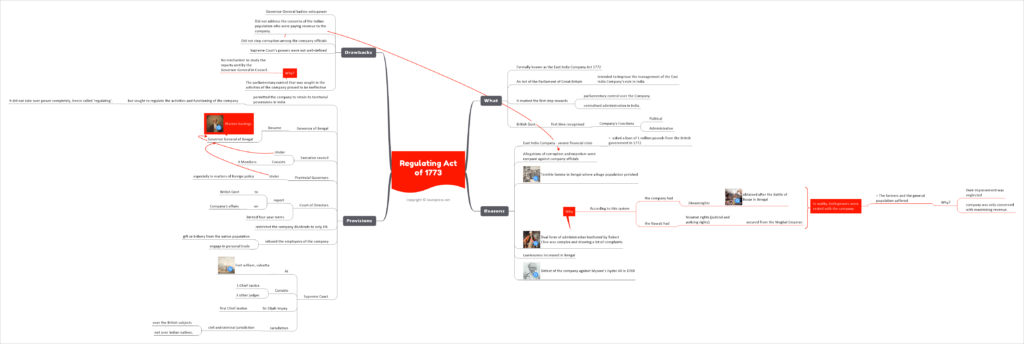Regulating Act of 1773: Background, Provisions & Drawbacks

Formally known as the East India Company Act 1772, the Regulating Act of 1773 is an Act of the Parliament of Great Britain intended to improve the governance of the East India Company’s rule in India. It marked the first step towards parliamentary control over the Company and centralised administration in India. British government recognized the company’s political and administrative functions for the first time through this act.

This topic of “Regulating Act of 1773: Background, Provisions & Drawbacks” is important from the perspective of the UPSC IAS Examination, which falls under General Studies Portion.
Background of the Regulating Act of 1773:
- Company’s financial crisis: The East India Company was under a severe financial crisis and asked for a loan of £1.5 million from the British government in 1772.
- Corruption: Allegations of corruption and nepotism were rampant against company officials.
- Famine: Terrible famine in Bengal where a huge population perished.
- The dual form of administration: instituted by Robert Clive was complex and drew a lot of complaints. According to the dual form system, the company had Diwani rights (obtained after the Battle of Buxar in Bengal) and the Nawab had Nizamat rights (judicial and policing rights secured from the Mughal emperor). However, in reality, both powers were vested with the company = the farmers and the general population suffered a lot as their improvement was neglected and the company was only concerned about maximizing their revenue.
- Lawlessness increased in Bengal.
- The defeat of the company against Mysore’e Hyder Ali in 1769.
Provisions of the Regulating Act of 1773:
- Permitted the company to retain its territorial possessions in India but sought to regulate the activities and functioning of the company. It did not take over power completely, hence called ‘regulating’.
- Governor of Bengal became Governor-General of Bengal (Warren Hastings was the first GGB).
- Executive council under Governor-General consisting of 4 members.
- Provincial governors at Madras and Bombay were brought under the control of the Governor-General of Bengal, particularly in the matters of foreign policy.
- Limited the Company’s dividends to 6% until it repaid a £1.5m loan and restricted the Court of Directors to four-year terms.
- It prohibited the servants of the company from involving in any private trade or taking presents or bribes from the “natives”.
- A Supreme Court was established at Fort William at Calcutta(1774) with Sir Elijah Impey as the first chief justice. Court also has three other judges. Court has both civil and criminal jurisdiction and with original & appellate jurisdiction over the British subjects and not over the Indian natives.
Drawbacks of the Regulating Act of 1773:
- Governor-General had no veto power.
- It did not resolve the concerns of the Indian population who were paying revenue to the company.
- It did not reduce corruption among the company officials.
- Supreme Court’s powers were not well-defined.
- The parliamentary control that was sought in the activities of the company proved to be ineffective as there was no mechanism to study the reports sent by the Governor-General in Council.
The Regulating Act of 1773 carries special importance in the constitutional history of India. Through this act, a written constitution was introduced for the first time for the governance of the company in India. This Act was the onset of efforts for British parliamentary controls on the administration of the Company in India. Due to this, the administration of the areas under the Company’s rule was no longer a private affair of the Company’s merchants.
